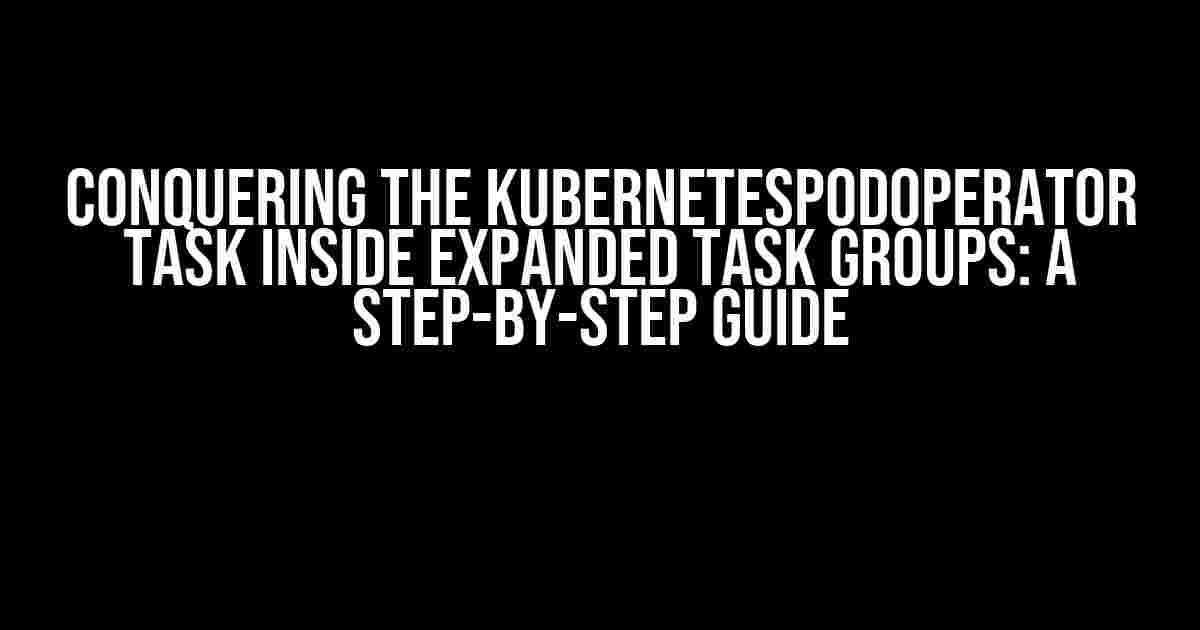KubernetesPodOperator, a powerful tool in the Apache Airflow ecosystem, can be a breeze to work with when used correctly. However, when it comes to integrating it with expanded task groups, things can get a bit tricky. In this article, we’ll delve into the world of KubernetesPodOperator and guide you through the process of making it work seamlessly within expanded task groups.
Understanding KubernetesPodOperator and Expanded Task Groups
Before we dive into the nuts and bolts of making KubernetesPodOperator work with expanded task groups, let’s quickly cover the basics.
What is KubernetesPodOperator?
KubernetesPodOperator is a custom operator in Apache Airflow that allows you to run Kubernetes pods as tasks within your workflows. It provides a seamless way to integrate your Kubernetes deployments with your Airflow workflows, enabling you to leverage the power of containerized applications.
What are Expanded Task Groups?
Expanded task groups, also known as task groups, are a feature in Airflow that enables you to group related tasks together. This grouping allows you to manage complex workflows more efficiently, making it easier to track progress, handle failures, and scale your workflows.
The Challenge: Making KubernetesPodOperator Work with Expanded Task Groups
When using KubernetesPodOperator within expanded task groups, you may encounter issues, such as:
- Error messages indicating that the task is not found or not executable
- Tasks not being triggered or executed correctly
- Difficulty in debugging and troubleshooting issues
These challenges arise due to the way KubernetesPodOperator interacts with the expanded task group’s context. To overcome these hurdles, we need to understand how to configure and use KubernetesPodOperator correctly within expanded task groups.
Step-by-Step Guide to Making KubernetesPodOperator Work with Expanded Task Groups
Follow these steps to successfully integrate KubernetesPodOperator with expanded task groups:
Step 1: Configure Your KubernetesPodOperator Task
Create a new task in your Airflow DAG using the KubernetesPodOperator:
from airflow.providers.cncf.kubernetes.operators.kubernetes_pod import KubernetesPodOperator
task = KubernetesPodOperator(
task_id='kubernetes_pod_task',
name='kubernetes_pod_task',
namespace='default',
image='python:3.9-slim',
cmds=['python', '-c'],
arguments=['print("Hello, World!")'],
in_cluster=True,
is_delete_operator_pod=True,
)
Step 2: Define Your Expanded Task Group
Create a new expanded task group in your Airflow DAG:
from airflow.models import TaskInstance
from airflow.utils.task_group import TaskGroup
task_group = TaskGroup(
group_id='my_task_group',
default_args={
'owner': 'airflow',
'retries': 1,
'retry_delay': timedelta(minutes=5),
},
)
# Add the KubernetesPodOperator task to the task group
task_group.add_task(task)
Step 3: Configure the Task Group Context
In the task group context, you need to specify the `task_instance` object, which will be used to execute the KubernetesPodOperator task:
@task_group.group/default
def my_task_group(dag, task_group, task_instance):
# Use the task_instance object to execute the KubernetesPodOperator task
task_instance.execute(task)
Step 4: Trigger the Task Group
Trigger the task group to execute the KubernetesPodOperator task:
trigger = Trigger(
dag=dag,
task_group=task_group,
trigger_rule=TriggerRule.ALL_SUCCESS,
)
task_group.trigger(trigger)
Troubleshooting Common Issues
If you encounter issues while using KubernetesPodOperator with expanded task groups, refer to the following troubleshooting tips:
Issue: Task Not Found or Not Executable
Check that the task_id in the KubernetesPodOperator matches the task_id in the task group.
Issue: Task Not Triggered or Executed Correctly
Verify that the task group context is correctly configured, and the task_instance object is used to execute the KubernetesPodOperator task.
Issue: Difficulty in Debugging and Troubleshooting
Enable logging and debug mode in your Airflow DAG to get more detailed output and error messages.
Conclusion
By following this step-by-step guide, you should now be able to successfully integrate KubernetesPodOperator with expanded task groups in your Airflow workflows. Remember to configure your KubernetesPodOperator task correctly, define your expanded task group, configure the task group context, and trigger the task group to execute the task. If you encounter any issues, refer to the troubleshooting tips provided. Happy orchestrating!
| Keyword | Description |
|---|---|
| KubernetesPodOperator | A custom operator in Apache Airflow that allows you to run Kubernetes pods as tasks within your workflows. |
| Expanded Task Groups | A feature in Airflow that enables you to group related tasks together, making it easier to manage complex workflows. |
Don’t forget to share your experiences and tips in the comments section below! If you have any questions or need further assistance, feel free to ask.
Frequently Asked Questions
Get the scoop on Expanded Argument and working on KubernetesPodOperator task inside expanded Task Group!
What is Expanded Argument and how does it relate to KubernetesPodOperator?
Expanded Argument is a mechanism in Airflow that allows you to dynamically generate arguments for an Operator, like KubernetesPodOperator, at runtime. It’s super handy when you need to pass complex or dynamic values to your Operator. Think of it as a flexible way to configure your tasks!
Why would I want to use Expanded Argument with KubernetesPodOperator?
Using Expanded Argument with KubernetesPodOperator lets you create dynamic, parameterized tasks that can be reused across your workflows. It’s especially useful when you need to run multiple tasks with similar configurations, or when you want to simplify your task definitions. Think of it as a way to template your tasks and make them more flexible!
How do I define an Expanded Argument for a KubernetesPodOperator task?
To define an Expanded Argument, you’ll need to create a Python function that returns a dictionary of arguments. This function will be executed at runtime, allowing you to dynamically generate the arguments for your KubernetesPodOperator task. You can then reference this function in your task definition using the `expand` argument. Easy peasy!
Can I use Expanded Argument with other Airflow Operators, not just KubernetesPodOperator?
Absolutely! Expanded Argument is a general-purpose mechanism in Airflow that can be used with any Operator that supports dynamic argument passing. While KubernetesPodOperator is a popular use case, you can also use Expanded Argument with other Operators, such as BashOperator, PythonOperator, or even custom Operators!
What are some common use cases for Expanded Argument with KubernetesPodOperator inside an expanded Task Group?
Expanded Argument is a game-changer when working with KubernetesPodOperator inside an expanded Task Group. You can use it to dynamically generate pod configurations, pass environment variables, or even create complex workflows that involve multiple dependent tasks. Some popular use cases include data processing, machine learning workflows, and CI/CD pipelines. The possibilities are endless!

